★★★
“School’s out… for ever.”
 Yang Yang (Yang) is an impetuous young policewoman, whose career is on thin ice after shooting the target of what was supposed to be a surveillance operation. Her superior officer – who also happens to be her uncle – is forced to re-assign her, and sends Yang to operate undercover as a student in a high school from which girls have been going missing. The leading suspect is an arrogant pupil who has recently been accused of sexually assaulting a classmate. Teacher Wu Xie (Zhou) is a witness in the case, so Yang is also tasked with making sure he isn’t pressured into changing his statement. Fitting in is going to be part of the problem for Yang – despite the help of Molly (Li), who takes the “new girl” under her wing.
Yang Yang (Yang) is an impetuous young policewoman, whose career is on thin ice after shooting the target of what was supposed to be a surveillance operation. Her superior officer – who also happens to be her uncle – is forced to re-assign her, and sends Yang to operate undercover as a student in a high school from which girls have been going missing. The leading suspect is an arrogant pupil who has recently been accused of sexually assaulting a classmate. Teacher Wu Xie (Zhou) is a witness in the case, so Yang is also tasked with making sure he isn’t pressured into changing his statement. Fitting in is going to be part of the problem for Yang – despite the help of Molly (Li), who takes the “new girl” under her wing.
The idea of cops being sent undercover to school is hardly a new one, best known in the West through 21 Jump Street. Originally a TV series starring Johnny Depp, this was recently revived as a movie franchise, with a lighter tone. However, in much of the East, the touchstone is 1991’s Fight Back to School, with Stephen Chow as the policeman. It became Hong Kong’s all-time top-grossing film to that point, and foreshadows the comedic approach of the Hollywood movie. Those are some enormous boots to fill, and it’s hardly any kind of surprise that Yang is no Stephen Chow in terms of comedic persona or timing.
That said, it isn’t too bad. The lead actress actually looks like she could still be at school, which is an immediate leg-up over the thirty-something Channing Tatum, who was the least convincing high-school student since Olivia Newton-John. Even her “bad policewoman” attitude isn’t entirely inappropriate, though the film does have an unevenness of tone which is quite frequently awkward. The juxtaposition of a jokey approach with the sexual assault charges has not travelled well to the West [and while I’m at it, why is this apparently Chinese film set in Singapore?]
The action is a bit up and down, too. The best bit is a lighting-fast fight between Yang and someone out to ensure Wu doesn’t make it to court. This contains a sequence where they’re repeatedly throwing the same knife back and forth, snatching it out of the air before returning it in the opposite direction. It’s like a pointy version of badminton, up until the moment where Yang, apparently bored with the whole thing, catches the blade in her teeth. The rest isn’t on the same level, and proceeds in almost exactly the way you would expect. For example, Yang gradually falls for Wu, creating a scandal at the school, and which brings her into conflict with another student who has a pre-existing crush. However, after a run of really bad movies on Amazon Prime, I was delighted to latch onto something capable of reaching the dizzy heights of artistic competence. Sometimes, you just have to take what you can get.
Dir: Kai Jiang
Star: Yang Zou, Zhuo Wen, Mengmeng Li, Naisen Hou
a.k.a. Bad Cop





 I suppose this could be claimed to be a “mockbuster”, not so different from the sound-alike films released by The Asylum, e.g. Snakes on a Train. There’s no doubt this was made to ride the coat-tails of its far larger and better advertised big sister. And it’s not alone, with at least two other Chinese films apparently in production, one animated and the
I suppose this could be claimed to be a “mockbuster”, not so different from the sound-alike films released by The Asylum, e.g. Snakes on a Train. There’s no doubt this was made to ride the coat-tails of its far larger and better advertised big sister. And it’s not alone, with at least two other Chinese films apparently in production, one animated and the 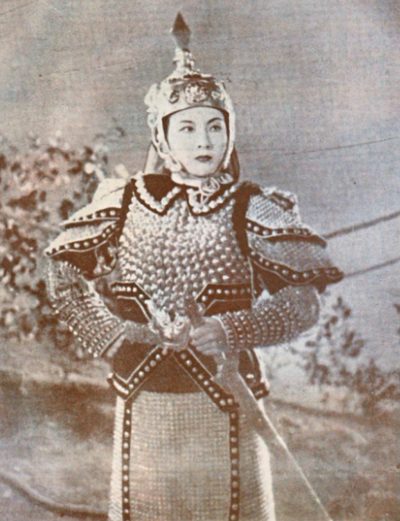 Y’know, considering this is now more than eighty years old, this was likely better than I expected. Chen makes for a solid and engaging heroine, right from the start, when she tricks the residents of a nearby village, who demand she hand over the proceeds of her hunting [I am hoping the dead bird which plummets to the ground with an arrow through it, less than three minutes in, was a stunt avian…]
Y’know, considering this is now more than eighty years old, this was likely better than I expected. Chen makes for a solid and engaging heroine, right from the start, when she tricks the residents of a nearby village, who demand she hand over the proceeds of her hunting [I am hoping the dead bird which plummets to the ground with an arrow through it, less than three minutes in, was a stunt avian…]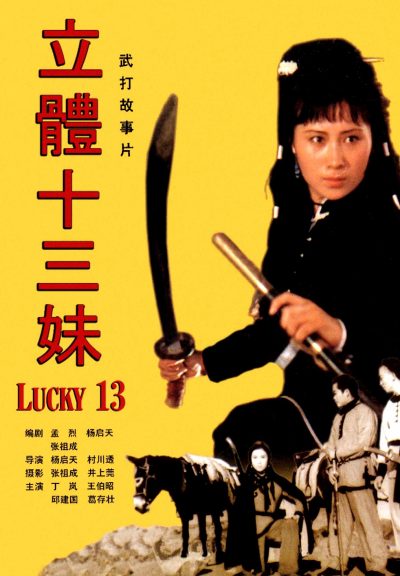 Despite a mangled title, what you have here is a straightforward tale of vengeance – and its attempts to diverge from that narrative are when the film is at its least interesting. Evil general Ji Xian Tang kills the parents of Ho Yu Fung (Ding): well, I suppose technically he only kills her father, her mother committing suicide by the corpse. In some remarkably unsubtle foreshadowing, Yu Fung is told, “This broadsword is our family heirloom. Our hope for vengeance is in your hands.” Given this, it’s no surprise she escapes with the help of a brave sacrifice from a servant, and becomes the pupil of a kung-fu master.
Despite a mangled title, what you have here is a straightforward tale of vengeance – and its attempts to diverge from that narrative are when the film is at its least interesting. Evil general Ji Xian Tang kills the parents of Ho Yu Fung (Ding): well, I suppose technically he only kills her father, her mother committing suicide by the corpse. In some remarkably unsubtle foreshadowing, Yu Fung is told, “This broadsword is our family heirloom. Our hope for vengeance is in your hands.” Given this, it’s no surprise she escapes with the help of a brave sacrifice from a servant, and becomes the pupil of a kung-fu master.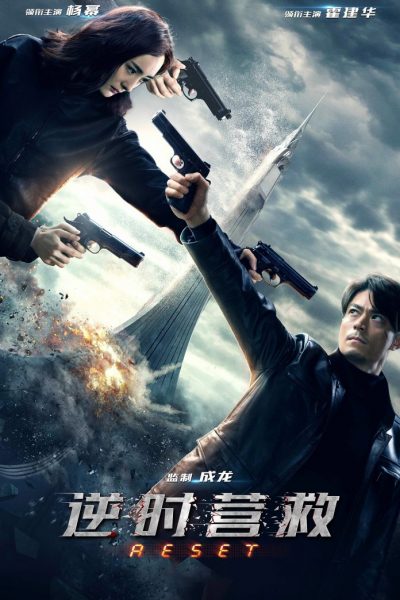 China seems to have discovered SF in a big way of late, most recently with The Wandering Earth, the biggest blockbuster you’ve probably never heard of. At time of writing, it’s the #7 film at the world-wide box-office this year, though 99% of its tally came in its home country. A couple of years earlier, this film made much less impact, yet for me is superior. It’s a time-travel piece, not dissimilar to Run Lola Run, with a triptych repeating the same events in three different ways, as the heroine strives to achieve a satisfactory outcome.
China seems to have discovered SF in a big way of late, most recently with The Wandering Earth, the biggest blockbuster you’ve probably never heard of. At time of writing, it’s the #7 film at the world-wide box-office this year, though 99% of its tally came in its home country. A couple of years earlier, this film made much less impact, yet for me is superior. It’s a time-travel piece, not dissimilar to Run Lola Run, with a triptych repeating the same events in three different ways, as the heroine strives to achieve a satisfactory outcome.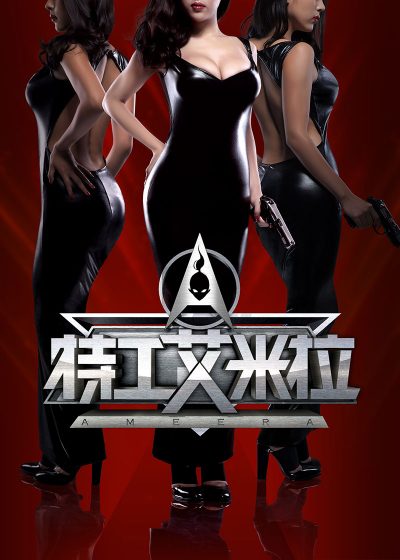 I should probably have learned from my first experience with Ms. Hu: the thoroughly mediocre jungle ensemble piece which was
I should probably have learned from my first experience with Ms. Hu: the thoroughly mediocre jungle ensemble piece which was  After reading some particularly scathing reviews of this, e.g. “stunningly atrocious”, I was braced for something
After reading some particularly scathing reviews of this, e.g. “stunningly atrocious”, I was braced for something 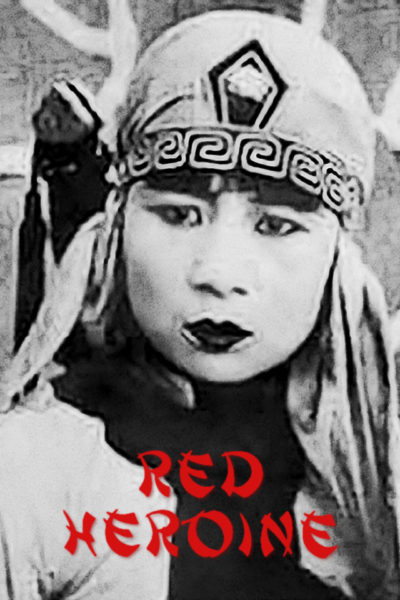 Tied somewhat to our March feature on the earliest action heroines in cinema, is this Chinese film, It’s not just the oldest surviving action heroine film from that country, it’s the oldest martial-arts film of any kind. This silent feature dates from all the way back in 1929 – I had to keep reminding myself that the “red” in the title was not a Communism reference, this being from well before such things. It’s most likely an attempt to cash in on The Burning of the Red Lotus Temple, a now-lost film series whose highly successful release had begun the previous year.
Tied somewhat to our March feature on the earliest action heroines in cinema, is this Chinese film, It’s not just the oldest surviving action heroine film from that country, it’s the oldest martial-arts film of any kind. This silent feature dates from all the way back in 1929 – I had to keep reminding myself that the “red” in the title was not a Communism reference, this being from well before such things. It’s most likely an attempt to cash in on The Burning of the Red Lotus Temple, a now-lost film series whose highly successful release had begun the previous year.

 This rattled around in pre-production for a while, originally being called Lady Bloodsport, and with the names linked to it being significantly higher in profile: Maggie Q, Shu Qi and Zhiyi Zhang. The end result here is obviously smaller and cheaper – the fights at its core all take place in the bastion of martial arts, a warehouse – and you can’t help but think, “What if…?” However, it’s still thoroughly enjoyable, despite – or, perhaps because of – feeling like a throwback to straightforward movies such as the original Bloodsport, which helped launch the career of Jean-Claude Van Damme in 1988.
This rattled around in pre-production for a while, originally being called Lady Bloodsport, and with the names linked to it being significantly higher in profile: Maggie Q, Shu Qi and Zhiyi Zhang. The end result here is obviously smaller and cheaper – the fights at its core all take place in the bastion of martial arts, a warehouse – and you can’t help but think, “What if…?” However, it’s still thoroughly enjoyable, despite – or, perhaps because of – feeling like a throwback to straightforward movies such as the original Bloodsport, which helped launch the career of Jean-Claude Van Damme in 1988.












